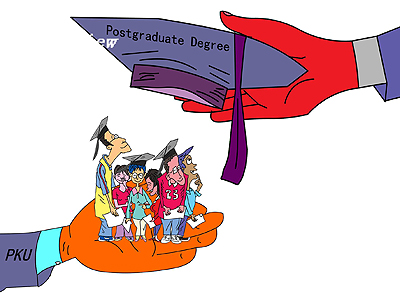
Peking University is open about who it wants as students. And it's only the cream of the crop that administrators wish to see walking through the hallowed gateway of China's top university. According to its 2008 recruitment plan for postgraduates announced on July 8, Peking University (PKU) will reserve 50 percent-80 percent of its quota for direct admission students. They say that's because most of its graduate school lecturers want it in this way. They also hope to recruit more academically reliable students through their somewhat controversial plan.
In line with this announcement, all the universities that are granted the right by the Ministry of Education to recommend direct admission students can do so to PKU. However, in reality, only key universities fall into this category.
The university's practice is supported by many people within education circles, who believe that this plan will ensure qualified students only head for PKU.
Professor Zhang Ming from Renmin University of China, another of the country's prestigious houses of learning, said that, in his university, postgraduate candidates from unknown colleges often have higher scores in the written tests, but problems will always emerge in the interview process. These students, he said, have spent so much time focusing on the entrance examination that they often have never read a single classic in their major fields. Once they are recruited, they can't adapt themselves to the required academic work, said Professor Zhang, who disclosed that almost all top universities prefer to recruit their own undergraduates. Peking University is just making this preference into a rule.
Those who are opposed to PKU's new plan, argue that the university is making it much more difficult for students from common universities to enter PKU. This is despite some of these students having the necessary skills and ability, they say. It seems unfair to deprive students the right of participating in the competition and to diminish their recruitment chances.
Give lecturers final say
Zhang Jingwei (Chinese Business View): Recent years have seen college graduates' unprecedented enthusiasm for graduate schools, but among them, there are few who are really interested in academic research. Most of them just hope to find a better job if they have a postgraduate diploma.
On one hand, examination-oriented education is under fierce attack; on the other hand, when there are experiments tried on quality-oriented education, people begin to doubt its fairness. The postgraduate student recruitment issue in Peking University proves this paradox.
Actually, high scores can be achieved in the examination by learning the required courses by rote, some even during a short period of time. It does happen that sometimes, in order to fulfill the dream of entering Peking University, students in common universities may begin to prepare for the graduate school entrance examination the first day they enter college, focusing on such compulsory courses as English and Mathematics. Comparatively, direct admission students from key universities have a much more overall solid foundation.
Peking University lecturers know best whether their pupils are qualified and devoted to academic work, because they have direct communication with the students. They should have the final say on which students to recruit. PKU's new recruitment plan fully reflects this improvement, so why should it be criticized?
Ren Mengshan (China Youth Daily): While more and more college graduates begin to participate in the graduate school entrance examination, there is a possibility that this examination will turn out to be another college entrance examination. For those who prepare to take the graduate school entrance examination, scores outweigh anything else, including the academic research capability. They spend most of their time on the two compulsory courses of English and political science, because they know if they fail in these two courses, no matter how well they perform in the courses of their major fields, they won't make the grade. In this sense, direct admission students can avoid this rigid regulation and thus spend more time improving their research capability.
From another perspective, to recruit direct admission students conforms to the rising call for more recruitment independence. Whether PKU can reserve half of the quota to direct admission students should be discussed against this background. Besides, lecturers should be given more space to express their ideas and wishes. Different from the score-based examinations, in the direct admission process, lecturers can have more opportunities
| 